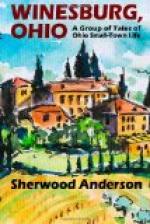Cowley & Son’s store did not face the main street of Winesburg. The front was on Maumee Street and beyond it was Voight’s wagon shop and a shed for the sheltering of farmers’ horses. Beside the store an alleyway ran behind the main street stores and all day drays and delivery wagons, intent on bringing in and taking out goods, passed up and down. The store itself was indescribable. Will Henderson once said of it that it sold everything and nothing. In the window facing Maumee Street stood a chunk of coal as large as an apple barrel, to indicate that orders for coal were taken, and beside the black mass of the coal stood three combs of honey grown brown and dirty in their wooden frames.
The honey had stood in the store window for six months. It was for sale as were also the coat hangers, patent suspender buttons, cans of roof paint, bottles of rheumatism cure, and a substitute for coffee that companioned the honey in its patient willingness to serve the public.
Ebenezer Cowley, the man who stood in the store listening to the eager patter of words that fell from the lips of the traveling man, was tall and lean and looked unwashed. On his scrawny neck was a large wen partially covered by a grey beard. He wore a long Prince Albert coat. The coat had been purchased to serve as a wedding garment. Before he became a merchant Ebenezer was a farmer and after his marriage he wore the Prince Albert coat to church on Sundays and on Saturday afternoons when he came into town to trade. When he sold the farm to become a merchant he wore the coat constantly. It had become brown with age and was covered with grease spots, but in it Ebenezer always felt dressed up and ready for the day in town.
As a merchant Ebenezer was not happily placed in life and he had not been happily placed as a farmer. Still he existed. His family, consisting of a daughter named Mabel and the son, lived with him in rooms above the store and it did not cost them much to live. His troubles were not financial. His unhappiness as a merchant lay in the fact that when a traveling man with wares to be sold came in at the front door he was afraid. Behind the counter he stood shaking his head. He was afraid, first that he would stubbornly refuse to buy and thus lose the opportunity to sell again; second that he would not be stubborn enough and would in a moment of weakness buy what could not be sold.
In the store on the morning when Elmer Cowley saw George Willard standing and apparently listening at the back door of the Eagle printshop, a situation had arisen that always stirred the son’s wrath. The traveling man talked and Ebenezer listened, his whole figure expressing uncertainty. “You see how quickly it is done,” said the traveling man, who had for sale a small flat metal substitute for collar buttons. With one hand he quickly unfastened a collar from his shirt and then fastened it on again. He assumed a flattering wheedling tone. “I tell you what, men have come to the end of all this fooling with collar buttons and you are the man to make money out of the change that is coming. I am offering you the exclusive agency for this town. Take twenty dozen of these fasteners and I’ll not visit any other store. I’ll leave the field to you.”




